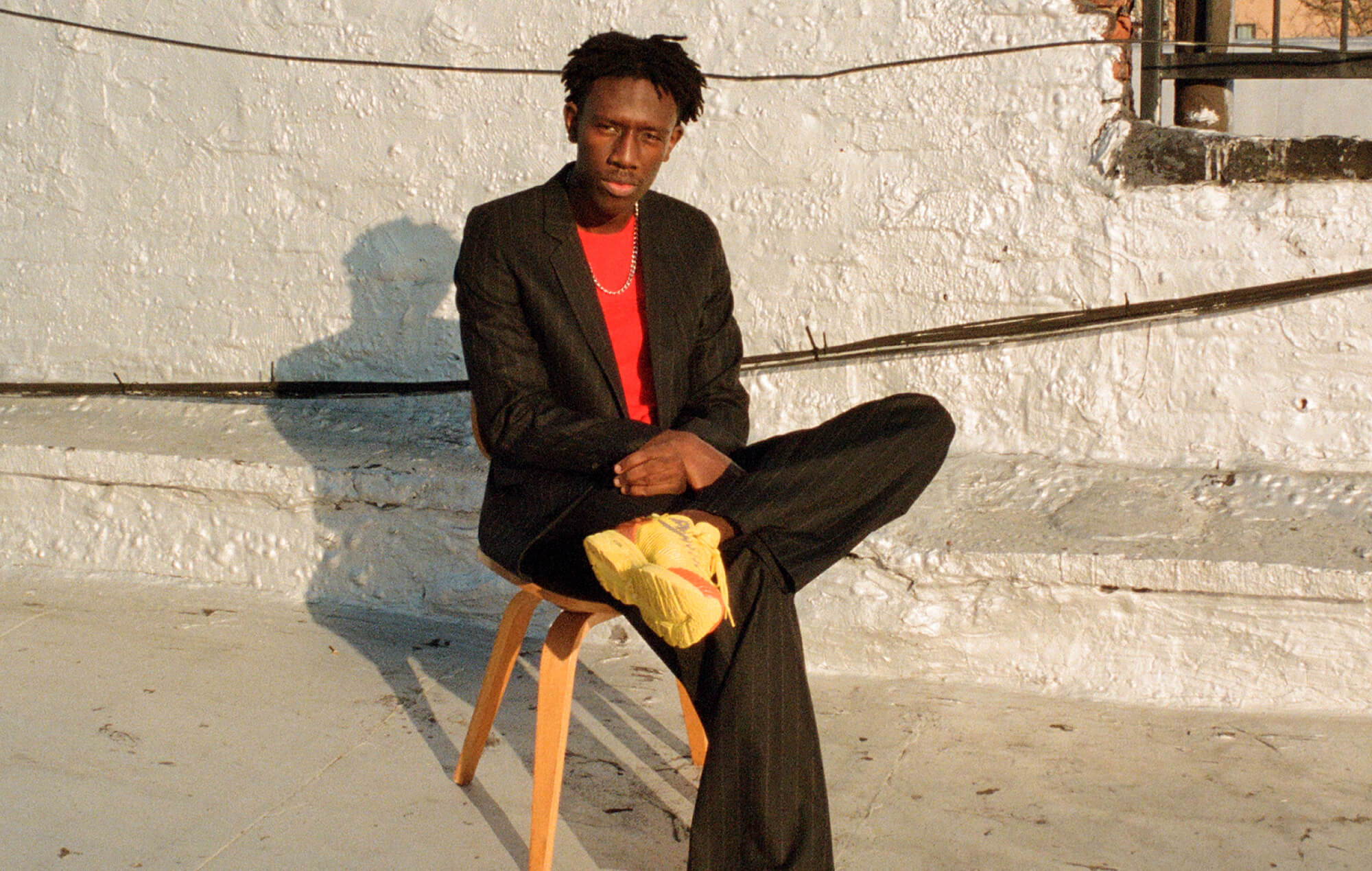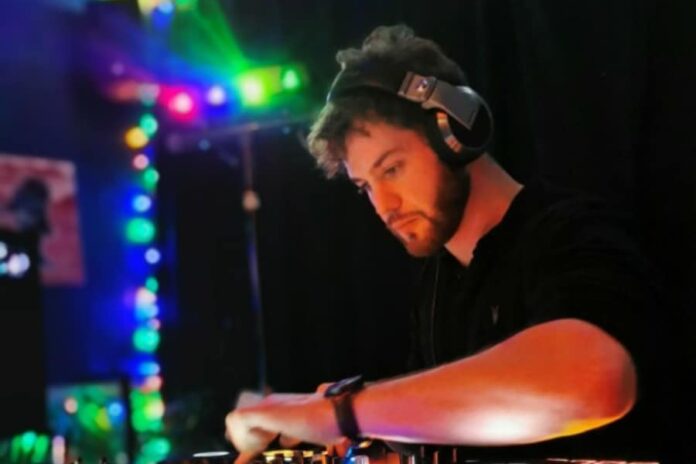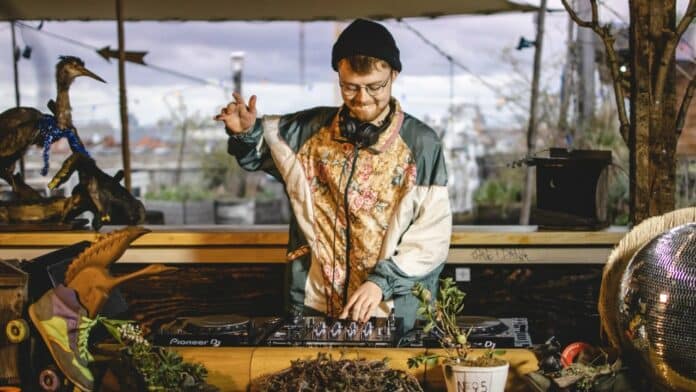
Binki: “My goal is always to try and make something that’s subversive”
Baraka Ongeri is reading motivational quotes from his phone to NME when he realises that one particular sentiment rings true to his current state of mind. “They must often change, who would be constant in happiness or wisdom,” he says slowly over Zoom. It’s a little like watching someone land on an epiphany in real-time: he exhales deeply as he repeats the words of ancient Chinese philosopher Confucius, before his eyes snap wide open.
“That quote really makes sense to me because my world is always changing,” explains Ongeri, better known as experimental singer-songwriter Binki, with a warm laugh. He’s calling from the apartment that he shares with his older brother in Brooklyn, New York; it’s a place that he describes as symbolic of how music upended his life a few years ago. “So now, I’m trying to accept and understand that personal growth is something you always have to be chasing.”
It’s a lucid and optimistic outlook that has shaped the musical path that has led Binki to his debut EP, ‘Motor Function’, released August 13. A medley of genre-splicing anthems that ring in your ears for days afterwards, the four-track effort is a thrilling patchwork of rap and indie-rock influences, nodding towards everyone from BROCKHAMPTON to King Krule. It’s here where uncompromising commentary on vulnerability, youthful frustration, and broken relationships – particularly on the near-claustrophobic ‘Landline’ – tumbles out of him with audacious energy over stop-start riffs and ear-bending beats.
“My goal is always to try and make something that’s subversive,” he says. His idiosyncratic choices – from the glitchy vocals and creeping synth on ‘Revolve’ to the blink-and-you-miss-it AutoTune moment on ‘Invisible Fence’ – prove that he comes good on this promise.
Things haven’t ever really stood still for Binki since he left the University of North Carolina with a theatre degree in summer 2018: burnt out from the unhealthy demands of the acting world, he turned to producing demos as a way to expend the “emotional energy” that was “weighing [him] down” post-graduation. It took months of upheaval and personal transformation – working dead-end delivery jobs, bad auditions, and rejections from casting agencies – to give him the final push to instead take his music seriously.
Inspired by the DIY ethos of the late 2010s bedroom-pop wave – a movement that has propelled the careers of Steve Lacy, Rex Orange County, and Omar Apollo – Binki uploaded ‘Marco’, a loose, bouncy alt-pop gem to streaming services in October that year. He explains: “Bedroom-pop was my first instance of seeing this subculture full of regular looking people, where regular stories were being told. Prior to that time, I don’t think the impulse ever came to me, and making music just didn’t seem possible.”
Fascinated by the growing popularity of playlisting culture, Binki watched “countless” YouTube videos on how to get his music added to tastemasking Spotify playlists. Without a push from a major label budget, it’s becoming increasingly – and worryingly – common for independent artists to have to chase momentum this way, but his hard work certainly paid off: ‘Marco’ gained significant traction across the streaming service, before his 2019 follow-up singles, festival-ready groover ‘Sea Sick’ and the buoyant, trippy ‘Heybb!’ caught the attention of industry heads – including famed producer Justin Raisen (Charli XCX, Joji) and The FADER label – after the latter appeared in an iPad advert in early 2020.
Throughout our hour-long conversation, he repeatedly refers to this period of his life as “serendipitous”, as this string of casual releases quickly developed into opportunities. But instead of riding the hype wave until it crashed somewhere beyond his control, Binki made a conscious decision to step back. “A lot of chaotic things were happening around me and I had to establish some sort of balance,” he says. “And it was really tough to do – and even worse during quarantine. That time just really, really fucked everything up for me. But I was going to make the music I wanted through sheer willpower.”
Driven by the competitive streak that he developed as an aspiring actor, last year, Binki returned to music in hopes of crafting another viral hit. He tried taking voice lessons and sharpening his piano skills, but he soon found that comparing his timeline to his peers was becoming detrimental to not only his career progression, but his mental wellbeing, too.
“I thought about what I wanted my career to look like, and realised that I’m not in a rush. And I just wanted to make sure that I’m always growing, so I decided to give myself the space to really focus on my own stuff,” he says. “I started to look at iconic artists who struggled throughout their early 20s; David Bowie had a bunch of projects that failed before he was 24, and Elliott Smith is another one that took a while to figure things out. It was really encouraging, but more importantly, I finally had to learn how to pace myself.” The resulting EP turned out to be an exercise in tension and release; it’s thrilling to hear Binki let loose after going through a period of self-reflection.

Some of Binki’s new music has been quietly influenced by Brooklyn’s loosely affiliated bunch of young musicians. The likes of Clairo, Snail Mail and Gus Dapperton all currently reside in the borough, and he says that he’s inspired by the enclave’s “genre-less” approach to their music, and the “kinetic energy” of New York City gigs – something that his formative years lacked as a teenager growing up in the rural suburbs of Pennsylvania.
When he moved to the city in late 2018, Binki started to accept that feeling like an outsider can be a superpower; he’s learned to be proud of both his Kenyan heritage and the years that he spent as a “geeky theatre kid”. He hopes that ‘Motor Function’ will do for listeners what the move did for him, which is to inspire them to “allow [themselves] complete freedom”, something that he felt deeply as he penned ‘Clay Pigeon’, a song about learning about how to open up to friends, partners, and most importantly, yourself.
“My favourite art is introspective and deeply personal. And a lot of the time, it’s about the one or two lines that really connect with you, which makes the whole song worth it,” he concludes. “If people can take something from the new record, or relate to anything that I talk about through these four songs and then apply it to their life, then my work is done. I want my fans to grow with me.”
Binki’s ‘Motor Function’ EP is released August 13





